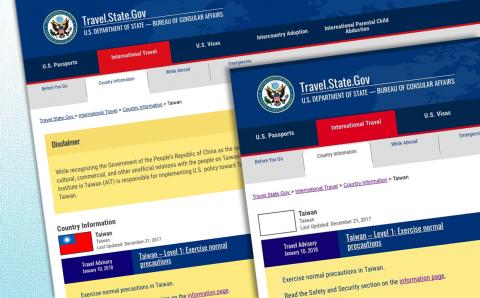The Ministry of Foreign Affairs yesterday expressed its disappointment over the removal of the Republic of China (ROC) flag from several US government Web sites, saying it has conveyed its grave concerns to Washington.
The ministry made the remarks hours after the Chinese-language United Daily News reported the disappearance of the ROC flag from the Web sites of the US Department of State’s Bureau of Consular Affairs and the Office of the US Trade Representative that displayed the flag on their introduction pages for Taiwan.
The newspaper published screenshots of the Taiwan introduction page on the US trade office’s Web site, one from June last year and the other from Tuesday, to show the removal of the flag.

Screen grab from the Bureau of Consular Affairs’ Web site
The US Department of State made the change on its Web site in September last year.
The ministry talked to the US about the matter several months ago, ministry spokesman Andrew Lee (李憲章) told a news conference in Taipei.
“That is why we found the latest flag removal from the Web sites of the two US government agencies not only unthinkable, but also unacceptable and disappointing,” Lee said, adding that Taipei has expressed its serious concerns to Washington.
The US had previously repeatedly reassured the ministry that Taiwan-US ties remained solid and that there was no shift in its policy, Lee said.
“However, we believe that such cases [the removal of the ROC flag] could influence the Taiwanese public’s perception of the status of relations between the two nations,” he said.
The ministry has taken note of Beijing’s increased attempts to use its “sharp power” to squeeze Taipei’s space within international organizations and oppress Taiwan on the supposedly free and open Internet, Lee said.
Such attempts are not conducive to the development of cross-strait ties, Lee added.
“Sharp power,” a term coined by the US-based National Endowment for Democracy, a non-profit organization that promotes democracy, refers to authoritarian efforts to “influence their target audiences by manipulating or distorting the information that reaches them.”
American Institute in Taiwan spokeswoman Sonia Urbom reiterated that the US’ policy toward Taiwan has not changed.
“The United States remains committed to our ‘one China’ policy based on the three joint communiques and the Taiwan Relations Act,” Urbom said.

MAKING WAVES: China’s maritime militia could become a nontraditional threat in war, clogging up shipping lanes to prevent US or Japanese intervention, a report said About 1,900 Chinese ships flying flags of convenience and fishing vessels that participated in China’s military exercises around Taiwan last month and in January have been listed for monitoring, Coast Guard Administration (CGA) Deputy Director-General Hsieh Ching-chin (謝慶欽) said yesterday. Following amendments to the Commercial Port Act (商港法) and the Law of Ships (船舶法) last month, the CGA can designate possible berthing areas or deny ports of call for vessels suspected of loitering around areas where undersea cables can be accessed, Oceans Affairs Council Minister Kuan Bi-ling (管碧玲) said. The list of suspected ships, originally 300, had risen to about 1,900 as

DAREDEVIL: Honnold said it had always been a dream of his to climb Taipei 101, while a Netflix producer said the skyscraper was ‘a real icon of this country’ US climber Alex Honnold yesterday took on Taiwan’s tallest building, becoming the first person to scale Taipei 101 without a rope, harness or safety net. Hundreds of spectators gathered at the base of the 101-story skyscraper to watch Honnold, 40, embark on his daredevil feat, which was also broadcast live on Netflix. Dressed in a red T-shirt and yellow custom-made climbing shoes, Honnold swiftly moved up the southeast face of the glass and steel building. At one point, he stepped onto a platform midway up to wave down at fans and onlookers who were taking photos. People watching from inside

Japan’s strategic alliance with the US would collapse if Tokyo were to turn away from a conflict in Taiwan, Japanese Prime Minister Sanae Takaichi said yesterday, but distanced herself from previous comments that suggested a possible military response in such an event. Takaichi expressed her latest views on a nationally broadcast TV program late on Monday, where an opposition party leader criticized her for igniting tensions with China with the earlier remarks. Ties between Japan and China have sunk to the worst level in years after Takaichi said in November that a hypothetical Chinese attack on Taiwan could bring about a Japanese

The WHO ignored early COVID-19 warnings from Taiwan, US Deputy Secretary of Health and Human Services Jim O’Neill said on Friday, as part of justification for Washington withdrawing from the global health body. US Secretary of State Marco Rubio on Thursday said that the US was pulling out of the UN agency, as it failed to fulfill its responsibilities during the COVID-19 pandemic. The WHO “ignored early COVID warnings from Taiwan in 2019 by pretending Taiwan did not exist, O’Neill wrote on X on Friday, Taiwan time. “It ignored rigorous science and promoted lockdowns.” The US will “continue international coordination on infectious